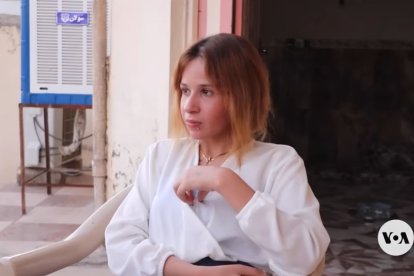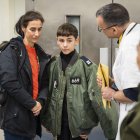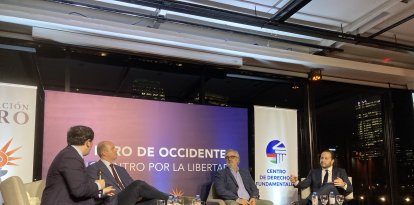Islamic State captive freed by Israel: They fed us 'meat from babies'
Fawzia Amin Saydo recounted for the first time the brutality of I.S. and Hamas terrorists, between whom she says "there is no difference."

Fawzia Amin Saydo, captive of I.S. and Hamas.
Fawzia Amin Saydo was kidnapped by the Islamic State (I.S.) when she was 11 years old. The terrorists invaded her town of Sinjar in northern Iraq in 2014 and took her to Syria. It was only in early October this year, after being beaten, raped and traded as a slave, that she was freed by the Israeli military while in the clutches of Hamas.
Back in her native country, the young woman began to recount, bit by bit, her decade of woes as one the more than 6,000 Yazidi women and children held in slavery since I.S. ravaged their area in 2016.
"They cooked rice and also meat and brought it to us," she told the British media outlet The Sun, about one of their first episodes after their capture, when they had gone, she recalls, between four and seven days without food. "While we were eating we knew something was wrong because the taste was weird but we just ate because we were hungry," he said before explaining that, when they finished, the terrorists told them "that the meat was from the babies. ... They showed us pictures of the beheaded kids and babies and said 'these are the kids you ate.'"

World
The testimony of a child who was held hostage in Gaza: He was beaten by civilians and tortured
Leandro Fleischer
The young woman was sold into slavery five times. In one, she had two children with a terrorist who beat and abused her. "I always did what I was told because I was so young and very scared," she says of the Islamic State women who tried to convert her to Islam.
'There is no difference between Hamas and ISIS'
In 2020, she traveled to Gaza, seeking protection from the family of her captor, who had been arrested. She encountered, however, "abusive" treatment: she was beaten and not allowed to leave her house. She was a "sabaya" (slave).
"I was never free to do what I wanted. If I was, I would have gone out of Gaza earlier." Once terrorists from the Gazan group held a gun to her head, simply because she had gone outside with a friend: "They said it was not allowed."
She missed her family, she told Voice of America. "I started taking pills, like 50 at a time," she told the media outlet, "but it didn't kill me." She also said she tried to end her life "21 times."

World
Hamas terrorists beat Palestinians trying to evacuate to a humanitarian area with sticks
Leandro Fleischer
She was forced to work in a hospital, where she recalls seeing that "they all had weapons, everyone had weapons everywhere." "All hospitals were being used as Hamas bases," she said in further confirmation that the jihadist group disguises sensitive areas as health centers. Earlier this year, Israel launched operations at Al Shifa Hospital, the largest in the Gaza Strip. Schools, private homes and UNRWA buildings are some of the places where Hamas weaponry has been found.
After her release, Hamas issued a statement claiming that Fawzia was there out of her own free will. She denies this claim, calling it "an absolute lie," and insists that she was not allowed to leave the house. "They were very bad, they forced us, they killed people, they forced me to be there," she said. "There is no difference between Hamas and ISIS."
Return home
A video of Fawzia asking for help on TikTok put her in contact with the lawyer who today represents her, Zemfira Dlovani. In an operation mediated by documentarian Alan Duncan, journalists, activists and business leaders, Israeli forces managed to orchestrate her escape in a car, monitored by drones, then a United Nations ambulance and, again, a car to her family.
The return of the young woman, now 21, to the arms of her family was captured in videos that quickly spread across social media.
Her children were left behind. They are now her main concern.
RECOMMENDATION





















